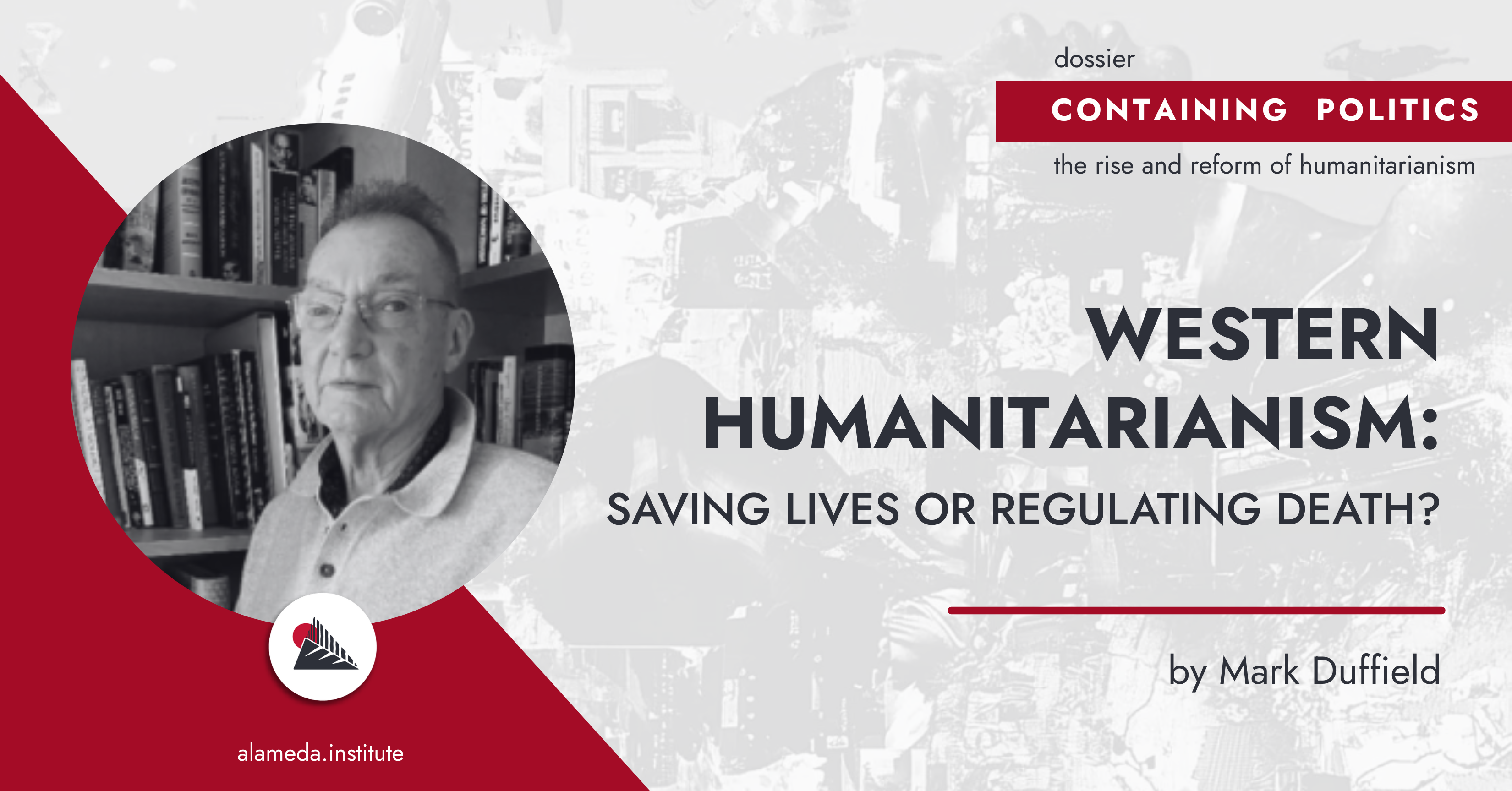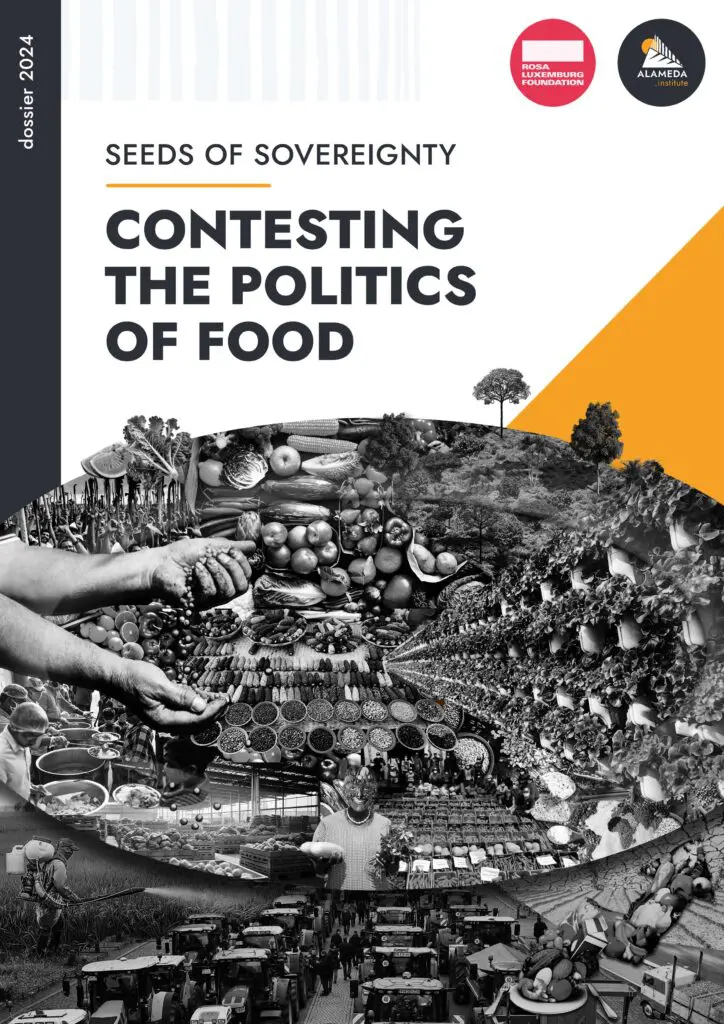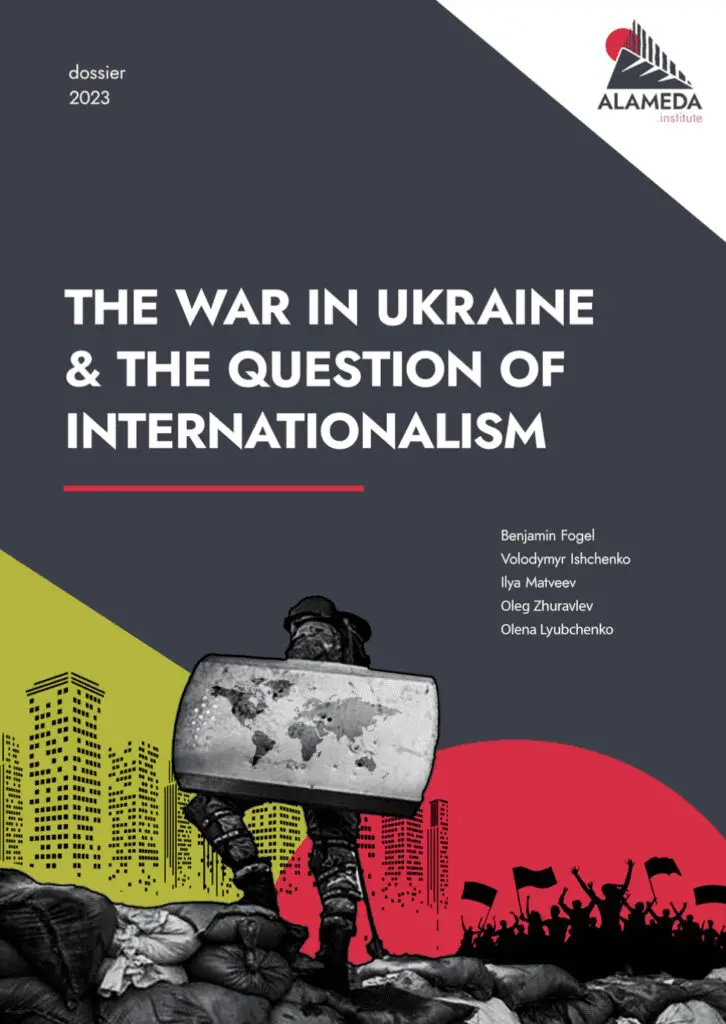Humanitarismo ocidental: Saving Lives or Regulating Death?

Com referência ao Sudão
O humanitarismo ocidental tem, sem dúvida, uma longa história. Usado aqui, no entanto, o termo é um recipiente para um conjunto novo e distinto de práticas sociais, políticas e técnicas contingentes que surgiram entre as décadas de 1970 e 1990 para regular o nível de excesso de mortes no mundo neocolonial.
A transformação histórica mundial na economia global durante as décadas em questão forneceu a base material para as mudanças no humanitarismo descritas aqui. Os EUA, o Reino Unido e outras economias ocidentais se desindustrializaram e se financeirizaram, pondo fim ao longo domínio manufatureiro do Ocidente. Em termos simples, ocorreu uma nova divisão definidora do mundo entre as economias de consumo ocidentais interconectadas e as economias de produção asiáticas. Juntamente com a ascensão do neoliberalismo, essa nova divisão internacional do trabalho, ainda que parcial, foi celebrada como a era ‘sem alternativa’ da ‘globalização’.
No entanto, perturbando essa narrativa teleológica do ‘triunfo do mercado’, um eixo diferente, mas necessário, entre a África e a Ásia Ocidental tomou forma durante a mesma fase do imperialismo liderado pelas finanças. Esse desenvolvimento denota de forma contundente a dependência contínua do capitalismo na acumulação primitiva: em vez de trocas desiguais per se, Os recursos físicos, o capital social e a mão de obra desse eixo espacial foram destinados à pilhagem externa e ao extrativismo ecológico por meio da guerra, do roubo legalizado e da desapropriação violenta. Em comparação com o que existia antes, os efeitos mensuráveis das décadas de violência e deslocamento que se seguiram foram adequadamente resumidos por Ali Kadri como ‘desdesenvolvimento’.
Não é por acaso que o eixo de desapropriação África-Ásia Ocidental foi o principal local do humanitarismo ocidental para testes de suas novas práticas regulatórias para ‘salvar vidas’. Em todos os aspectos - carreiras, despesas, crescimento e influência - as ONGs se beneficiaram dos salários do imperialismo. Rompendo com as tradições anteriores do humanitarismo liberal de autonomia em relação à política externa ocidental (se não antipatia por ela), o humanitarismo ocidental, de modo geral, tornou-se pró-EUA e anticomunista. Profundamente envolvido na reconquista neocolonial de ex-colônias independentes, na década de 1980 o humanitarismo ocidental defendia uma visão de mundo pós-moderna baseada na complexidade
Embora tenham sido eclipsadas após o lançamento da devastadora Guerra ao Terror liderada pelos EUA no início dos anos 2000, a investigação das práticas regulatórias do humanitarismo ocidental nas décadas anteriores é um excelente exemplo da necessidade de autocrítica na causa da libertação e de um mundo sustentável.
A invasão das ONGs
As ONGs internacionais se expandiram rapidamente ao longo do eixo África-Ásia Ocidental durante a década de 1980. Dada a velocidade relativa desse evento, o termo ‘invasão’ é adequado. Foi uma época de desindustrialização no Ocidente e de desvio da esquerda para a direita com o colapso da União Soviética. De fato, muitos camaradas desiludidos buscaram consolo juntando-se à força expedicionária das ONGs. Refletindo o zeitgeist neoliberal, especialmente a privatização dos serviços públicos, a invasão foi paga pela transferência do financiamento da ajuda ocidental dos Estados para um setor privado de ONGs em expansão.
A invasão das ONGs também pode ser vista como uma ressonância dos aspectos do ‘novo’ imperialismo que surgiu um século antes. No final do século XIX, a massa de terra do mundo colonizado cresceu rapidamente e sua administração atingiu novos patamares de barbárie, como refletido em uma série do que Mike Davis chamou de ‘holocaustos do final da era vitoriana’. Paradoxalmente, uma justificativa moral central que estimulou o novo imperialismo foi a ‘antiescravidão’. Durante a ‘corrida pela África’, os imperialistas equiparavam a soberania negra irrestrita à tirania da escravidão, ao despotismo e, implicitamente, à escravidão, desastre humanitário. Quando a Grã-Bretanha ocupou o Egito em 1882, dada a prevalência da escravidão doméstica, essa racial A equação entre escravidão e despotismo foi usada para definir os egípcios como incapazes de governar. Conforme explorado por Adom Getachew, durante a década de 1920, os mesmos temores estavam em jogo quando a Libéria e a Abissínia - ambas sociedades proprietárias de escravos - foram incorporadas e administradas pela Liga das Nações como ‘soberanos desiguais’. Várias décadas depois, uma sensação semelhante de desastre iminente também informou a ação de retaguarda do Serviço Político colonial do Sudão para impedir a independência do país em 1956. O humanitarismo ocidental não perdeu esse medo da soberania negra, ele simplesmente reformulou seus parâmetros.
O rápido surgimento de ONGs ao longo do eixo África-Ásia Ocidental durante a década de 1980 anunciou a fase neocolonial do humanitarismo ocidental. As ONGs eram o meio prático de recuperação em nível comunitário dentro da estrutura de representação do imperialismo liderado pelos EUA. Em vez de ser antiescravagista, a força motriz do humanitarismo ocidental era agora, como resumiam as explosões irreverentes de Bob Geldof, da Band Aid, um ‘antiautoritarismo’ dirigido, em particular, à burocracia dos estados africanos. Parafraseando um aspecto da apreciação um tanto controversa de Hannah Arendt sobre a contribuição da Grã-Bretanha para o novo imperialismo: a invasão das ONGs, com sua crítica antiautoritária, atraiu os melhores idealistas entre os jovens ocidentais.
A invasão também foi sintomática da ruptura política entre a esquerda metropolitana em relação à sua agitação anti-imperial anterior. O espírito da época foi capturado na declaração de Jean-François Lyotard, em 1979, de que o tempo das grandes narrativas havia acabado. No ano seguinte, a própria Dama de Ferro, Margaret Thatcher, complementou o teórico francês com seu notório pronunciamento de que ‘não há alternativa’ ao neoliberalismo.
Humanitarismo ocidental
Entre as ONGs, a rejeição das grandes narrativas tinha como alvo principal o marxismo, especialmente os relatos estruturais inspirados em Marx sobre o desenvolvimento do subdesenvolvimento que eram populares na época. Em 1985, a seção francesa da Médicos Sem Fronteiras (MSF) declarou publicamente seu rompimento com o terceiro-mundismo que até então definia o internacionalismo de esquerda. Adotando uma posição abertamente pró-EUA, pró-Israel e anticomunista, dissociou o capitalismo da desapropriação violenta que estava fortalecendo seu controle ao longo do eixo África-Ásia Ocidental. As tentativas de estabelecer essas conexões foram ridicularizadas como ‘ideologia’. Depois de declarar que o mundo estava politicamente adequado, MSF passaria a se dedicar ao humanitarismo 101, ou seja, ‘salvar vidas’.’
Mas por que, se o capitalismo era benigno, havia necessidade de salvar vidas? É aqui que surge a conexão racial entre a antiescravidão do novo imperialismo e o antiautoritarismo das ONGs modernas. Em uma atualização da visão de mundo liberal que equiparava a soberania negra emancipada com o desastre humanitário, para MSF o culpado não era o imperialismo, mas o surgimento de Estados africanos totalitários independentes e produtores de desastres. De agora em diante, além disso, MSF não hesitaria em denunciá-los. Especialmente se eles reivindicassem uma agenda de esquerda ou independente.
Se MSF garantiu a cabeça de ponte neocolonial, foram os acadêmicos britânicos, como Randolph Kent e David Booth, e as ONGs, como Oxfam e Save the Children, que explicaram como entender um mundo em que o ‘capitalismo’ e o ‘imperialismo’ haviam sido eliminados por mágica. As narrativas causais foram consideradas inválidas devido à ‘complexidade’ caótica das interações entre pessoas, coisas e natureza. Leis gerais ou relações determinantes eram impossíveis. O que era, essencialmente, uma racionalização comemorativa da ignorância, serviu para tornar o mundo exterior incognoscível além da experiência imediata. Os problemas estavam ligados a épocas e lugares específicos, não permitindo nenhuma generalidade histórica entre eles.1No entanto, o que é revelador é que os mesmos atores sociais que se insurgiram contra o capitalismo e a ideologia acolheram sem problemas a inevitabilidade teleológica da ‘globalização’. A mais grandiosa das grandes narrativas que, como argumenta Gabriel Rockhill, reproduz, em um ato essencial de farsa histórica, o espectro do marxismo vulgar que eles diziam descartar! Se o revanchismo político francês alcançou o neoliberalismo, o empirismo britânico vinculou o humanitarismo ocidental à quantificação, à cibernética e ao aprendizado de máquina.
Forjada na luta imperial contra o marxismo e nas tentativas de criação de um mundo independente em meados do século XX, durante a década de 1980, na forma de um campo de força generalizado de múltiplas práticas de antecipação, uma visão de mundo cibernética tomou forma dentro do humanitarismo ocidental décadas antes da disseminação e do aprisionamento contínuos do pensamento de máquina corporativo ou da IA.2Consulte Fred Turner, From Counterculture to Cyberculture [Da contracultura à cibercultura]: Stewart Brand, a Whole Earth Network e a Ascensão do Utopismo Digital (University of Chicago Press, 2006). Usar a IA na luta pela libertação e por um mundo sustentável exigiria que ela se libertasse, como fez a China, da ecologia emaranhada das forças e dos interesses político-corporativos ocidentais.
Naturalização do conflito
A fome no Sudão em meados da década de 1980 foi um local de agendas nacionais e internacionais concorrentes. Agitando a bandeira humanitária, o acampamento de ONGs que foi rapidamente montado marcou o fim da breve experiência de 25 anos do Sudão em desenvolvimento autodirigido. As ONGs eram poucas antes de 1984; em poucos anos, mais de cem estavam registradas em Cartum. Na época, não havia escassez de relatos estruturais da fome inspirados em Marx.3Consulte Claude Meillassoux, “Development or Exploitation: A fome no Sahel é boa para os negócios?” Revisão da Economia Política Africana 1, no. 1 (1974): 27-33, https://doi.org/10.1080/03056247408703235; Jay O'Brien, “Sowing the Seeds of Famine: The Political Economy of Food Deficits in Sudan”.” Revisão da Economia Política Africana 12, no. 33 (1985): 23-32; Taisier Mohamed Ahmed Ali, The Cultivation of Hunger (O cultivo da fome): Estado e agricultura no Sudão (Khartoum University Press, 1989). Essas percepções, no entanto, foram rapidamente varridas pelo momento desorientador da retomada neocolonial.
Além do medo liberal da soberania negra, como argumentei em Global Governance and the New Wars (Governança global e as novas guerras), argumentava-se que os motivadores dos conflitos entre comunidades eram múltiplos e específicos de cada lugar, levando em conta os fatores sociais, econômicos e ambientais. Para o humanitarismo ocidental, a guerra entre comunidades não tinha uma causa generalizável ou primordial além da escassez e da ignorância que afligiam os envolvidos. O ‘setor de ajuda’ do Ocidente, financiado com recursos públicos, interpretaria as próximas décadas de violência e instabilidade por meio das lentes a-históricas, mas quantificáveis, da complexidade cibernética.
No entanto, desde a década de 1950, a expansão da agricultura comercial minou progressivamente a agricultura de subsistência. A partir do final da década de 1970, o ajuste estrutural de autoria norte-americana acelerou essa dissolução ao reorientar a produção agrícola do Sudão para a exportação. Já sob pressão, as possibilidades de lucro que isso proporcionou transformaram a antiga reciprocidade entre pastores e agricultores em uma relação explorável de guerra permanente.4Mark Duffield e Nicholas Stockton, “How Capitalism Is Destroying the Horn of Africa: Sheep and the Crises in Somalia and Sudan”.” Revisão da Economia Política Africana 51, no. 179 (2024): 105-16. Os surtos periódicos resultantes de extrativismo paramilitar de recursos, destruição ecológica, polarização da violência racial e migração forçada acabaram se transformando na tão esperada fratura do Estado do Sudão em 2023.
Com sua falta de vontade de generalizar, o humanitarismo ocidental normalizou a evolução da violenta economia neocolonial do Sudão. Seguiram-se quatro décadas de emergências humanitárias consecutivas e favoráveis ao financiamento, mascarando um ataque brutal do capital mercantil à sociedade e à natureza. Embora tenha gerado pouco conhecimento real sobre o Sudão - ou seja, conhecimento de uso prático para aqueles que lutam contra o empobrecimento enquanto lutam por seus direitos, terras e recursos - essas foram décadas lucrativas de crescimento institucional para o setor de ajuda humanitária.
Previsão de fome
Os relatos estruturais escandalizaram a fome como uma arma na guerra civil social em curso e exigiram reforma política e proteção econômica. O pensamento da complexidade, por outro lado, normalizou a fome, transformando-a em um resultado previsível de um conjunto de dados probabilísticos de sinais e alertas comportamentais. Afinal, a fome era algo esperado em um país ‘subdesenvolvido’.
Embora sua causa possa ser ‘complexa’, por sorte, as ONGs desenvolveram uma ‘tecnologia’ para prever a ocorrência da fome - uma tecnologia de uso duplo que também se mostraria útil na competição pela atenção da mídia e pelo financiamento. Desde a década de 1970, sabia-se que as variações nos preços do mercado local de alimentos, gado ou mão de obra muitas vezes prefiguravam padrões de comportamento atípicos entre agricultores e pastores. Essas mudanças se tornaram um indicador da iminência da fome.
Durante a década de 1980, o Sudão foi um laboratório para o Alerta Precoce de Fome (FEW). A lógica era que um alerta oportuno permite a intervenção precoce, o que salva mais vidas. Inicialmente, o FEW dependia da coleta intensiva de dados sobre preços e movimentos populacionais de mercados e pontos de coleta geograficamente dispersos. A centralização, o cálculo manual e a disseminação levavam semanas rotineiramente. A importância da natureza manual dessa tecnologia preditiva inicial não deve ser ignorada. Como argumentei em Pós-humanitarismo, O FEW era uma ecologia de atividades fundamentadas que se resumia a uma prática sociotécnica estabelecida de solução de problemas uma década ou mais antes da facilitação proporcionada pela computação generalizada e três décadas antes de sua codificação com a chegada sem fôlego do ‘humanitarismo digital’ com sensoriamento remoto.
Em vez de a tecnologia ser um determinante força externa, o FEW sugere uma contra-história em que a tecnologia é um elemento socialmente determinado ferramenta no centro da guerra civil incessante do capitalismo.5Consulte Gabriel Rockhill, Contra-história do presente: Untimely Interrogations into Globalization, Technology, Democracy (Interrogações inoportunas sobre globalização, tecnologia e democracia) (Duke University Press, 2017). Como uma tecnologia ‘pura’ de previsão, o FEW nunca funcionou. Mesmo que a morte seja prevista, em um mundo desigual, algumas vidas são mais valorizadas do que outras. Como uma tecnologia socialmente determinada, o FEW é inseparável da ecologia histórica de práticas, agendas institucionais e lutas políticas que definem a fase neocolonial de recaptura e pacificação político-cultural do humanitarismo ocidental.
Regulação da morte
O Alerta Precoce de Fome foi especialmente importante para o desenvolvimento da função reguladora do humanitarismo ocidental. Para uma determinada população, a previsão requer a existência de uma referência de mortalidade quantificável que, uma vez violada, permite que uma emergência humanitária seja oficialmente declarada. No entanto, qualquer referência, que não esteja atrelada às normas europeias, envolve necessariamente um processo de negociação sociocultural racializada de acordo com uma medida de excesso de mortes adequada ao ‘subdesenvolvimento’ e, ao mesmo tempo, moralmente aceitável para os consumidores ocidentais.
Em vez de salvar vidas, a contra-história do humanitarismo ocidental é a tentativa, impulsionada pela tecnologia, de regular o excesso de mortes ao longo do eixo África-Ásia Ocidental de predação e violência neocolonial.
Desde a década de 1970, houve um aumento secular no nível de desnutrição considerado uma emergência humanitária. Os níveis que justificaram a invasão do Sudão pelas ONGs em meados da década de 1980 tornaram-se, na década de 1990, ‘normais’ na África. Essa tendência foi resumida em 2004 com a criação da Classificação Integrada da Fase de Segurança Alimentar (IPC) da ONU. Como um conjunto de referências, a escala IPC tem sido amplamente celebrada como o ‘padrão ouro’ da prática humanitária. Até recentemente, pelo menos, acreditava-se que ela ajudava o setor de ajuda a controlar o flagelo da fome.
No entanto, em uma indicação do abismo experiencial que agora divide as sociedades de consumo ocidentais da maioria do mundo, poucos fizeram a pergunta óbvia: "O que é isso? Como seria uma emergência declarada pelo IPC se transposta para a Europa? Como Nicholas Stockton está explorando atualmente,6Comunicação pessoal. Uma verdade chocante se esconde nessa pergunta. No caso do Reino Unido, durante o auge da crise da Covid-19, a taxa de mortalidade excessiva, de todas as causas, foi de cerca de 60.000 por ano. Isso mal se registra na escala de desastres do IPC. Em uma base per capita, para que uma emergência humanitária completa da ONU fosse declarada no Reino Unido, seria necessário que houvesse bem mais de quatro milhões de mortes em excesso por ano! Esses números dão uma ideia dos níveis terríveis de excesso de mortes que o neocolonialismo normalizou no mundo majoritário.
Para as sociedades de consumo ocidentais, o imperialismo e o colonialismo são ‘história’: questões herdadas que, no máximo, exigem alguma reparação. Sugerir que a fase neocolonial das guerras por procuração dos EUA, que está em andamento e de fato se intensifica, é tão violenta quanto o colonialismo, talvez ainda mais, é correr o risco de ser ridicularizado. No entanto, para muitos países do eixo África-Ásia Ocidental, inclusive o Sudão, o alto índice de mortes em excesso da ONU sugere o contrário. Quando consideramos o custo de quatro décadas de guerra permanente - a desapropriação, a imiseração e o deslocamento; a destruição dos meios de subsistência, da infraestrutura pública e da biosfera; a austeridade, a dizimação urbana e a dispersão das classes profissionais - um quadro diferente está esperando para ser desenhado.
Humanitarismo ocidental em crise
O humanitarismo ocidental, conforme descrito acima, entrou em um período de crise com o lançamento da Guerra ao Terror liderada pelos EUA. Com seu ethos polarizador ‘conosco ou contra nós’, grandes áreas da Ásia Ocidental e da África tornaram-se efetivamente zonas de fogo livre. Com o desaparecimento do apoio internacional para o acesso humanitário e a preocupação associada com os ‘direitos humanos’, o setor de ajuda humanitária se isolou defensivamente. Desde então, a insularidade dos trabalhadores humanitários aumentou, juntamente com a dependência do gerenciamento remoto orientado por máquinas. Ajudado por cortes orçamentários e maior supervisão gerencial, o papel regulador do setor de ajuda humanitária ficou à deriva com a crescente violência e impunidade das últimas décadas.
O que o humanitarismo ocidental deixou para o mundo, no lugar do estruturalismo e do radicalismo político que ele deslocou? Aqui nos deparamos com o ‘paradoxo humanitário’.
No centro desse paradoxo está o fato de que, apesar de estarem no Sudão há cinquenta anos, por exemplo, as ONGs têm pouco conhecimento real sobre esse país. Como agente de recaptura e pacificação neocolonial, o setor de ajuda humanitária é incapaz de criar conhecimento útil para aqueles que lutam contra o neocolonialismo e a violência, a desapropriação e o empobrecimento que ele desencadeou. Embora se dedique a ‘salvar vidas’ e a apoiar ‘direitos’, o setor de assistência não pode fornecer a história de um povo,7Para um esboço da história de um povo do Sahel ocidental em tempos desastrosos, consulte Rahmane Idrissa neste dossiê. por assim dizer. Como forma de ocultar esse paradoxo, encontramos no discurso humanitário ocidental vários reflexos opostos.
Com relação ao Chifre da África, nos últimos anos, houve previsões recorrentes e egoístas sobre a ‘fome que virá’, cada uma delas buscando atrair a atenção de Estados ocidentais que, de outra forma, estariam ocupados com a militarização. Muitos esperam que a bandeira da ‘mudança climática’, apoiada pela objetividade da ciência e por sua capacidade de ofuscar décadas de cumplicidade institucional e, ao mesmo tempo, renovar o desejo de intervir motivado pela segurança, mantenha o humanitarismo ocidental em marcha.
Se a ‘mudança climática’ busca traçar um limite para décadas de intervenção agravada, quando a escalada da violência neocolonial é de fato abordada, encontramos mais uma iteração do medo racial de longa data do liberalismo da soberania negra irrestrita: por exemplo, a ameaça representada por estados africanos totalitários independentes, seus titulares corruptos e aspirantes não estatais vorazes. O importante aqui é a adoção acadêmica da política transacional do ‘mercado político’ neoliberal, onde tudo tem um preço. Programas de pesquisa dedicados estão agora ocupados com o ‘mapeamento’ desse espaço não regulamentado onde, desprovidos de projetos imperiais, os tiranos africanos e as hegemonias regionais vendem regularmente uns aos outros rio abaixo, por assim dizer.
O paradoxo do humanitarismo ocidental está em sua incapacidade de constituir uma história de resistência e luta dos povos contra a opressão neocolonial. A única história que o humanitarismo ocidental é capaz de produzir são relatos comemorativos ou egoístas de suas próprias tecnologias de intervenção, vigilância e digitalização.
NOTAS DE RODAPÉ
- 1No entanto, o que é revelador é que os mesmos atores sociais que se insurgiram contra o capitalismo e a ideologia acolheram sem problemas a inevitabilidade teleológica da ‘globalização’. A mais grandiosa das grandes narrativas que, como argumenta Gabriel Rockhill, reproduz, em um ato essencial de farsa histórica, o espectro do marxismo vulgar que eles diziam descartar!
- 2Consulte Fred Turner, From Counterculture to Cyberculture [Da contracultura à cibercultura]: Stewart Brand, a Whole Earth Network e a Ascensão do Utopismo Digital (University of Chicago Press, 2006). Usar a IA na luta pela libertação e por um mundo sustentável exigiria que ela se libertasse, como fez a China, da ecologia emaranhada das forças e dos interesses político-corporativos ocidentais.
- 3Consulte Claude Meillassoux, “Development or Exploitation: A fome no Sahel é boa para os negócios?” Revisão da Economia Política Africana 1, no. 1 (1974): 27-33, https://doi.org/10.1080/03056247408703235; Jay O'Brien, “Sowing the Seeds of Famine: The Political Economy of Food Deficits in Sudan”.” Revisão da Economia Política Africana 12, no. 33 (1985): 23-32; Taisier Mohamed Ahmed Ali, The Cultivation of Hunger (O cultivo da fome): Estado e agricultura no Sudão (Khartoum University Press, 1989).
- 4Mark Duffield e Nicholas Stockton, “How Capitalism Is Destroying the Horn of Africa: Sheep and the Crises in Somalia and Sudan”.” Revisão da Economia Política Africana 51, no. 179 (2024): 105-16.
- 5Consulte Gabriel Rockhill, Contra-história do presente: Untimely Interrogations into Globalization, Technology, Democracy (Interrogações inoportunas sobre globalização, tecnologia e democracia) (Duke University Press, 2017).
- 6Comunicação pessoal.
- 7Para um esboço da história de um povo do Sahel ocidental em tempos desastrosos, consulte Rahmane Idrissa neste dossiê.

ARTIGOS RELACIONADOS
A Big Tech está tentando acabar com a democracia?
Outro chefão cai, nada muda
Soberanos do Brasil
Estamos agora no estágio Sopranos do imperialismo
O ‘Complexo Militar-Digital’ controla tudo?
Quem são os humanitários?
Por que a soberania digital é importante
Uma administração sem lei de Trump se descontrola no Caribe
Uma questão pós-social
A política da normalidade na Rússia e na Ucrânia em tempos de guerra
Sobre os limites do humanitarismo
A máquina humanitária: Gestão de Resíduos em Guerras Imperiais
Deslocamentos
Recuperando a soberania digital: Um roteiro para construir um ecossistema digital para as pessoas e o planeta
Partido Labour, ajuda externa e o fim da ilusão
Ecocídio: Explorando as raízes e as aplicações atuais do conceito
A Revolução Presa do Camponês
Humanitarismo ocidental: Saving Lives or Regulating Death?




